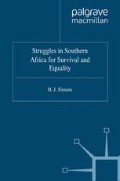Abstract
The African family in South Africa’s customary societies was patriarchal and polygynous. Though the head had wide powers over the wives, children and dependants in his household, it cannot be said — as was said of early Roman law (Bodenheimer, 1940: 20) — that the law ‘stopped on the threshold of the home’. He administered any property they acquired, was held responsible for their civil wrongdoing and arranged the marriages of his children.
Access this chapter
Tax calculation will be finalised at checkout
Purchases are for personal use only
Preview
Unable to display preview. Download preview PDF.
References
Bennett, T.W. and Peart, N.S., ‘The Dualism of Marriage Laws in Africa’, in T.W. Bennett et al. (eds), Family Law in the Last Two Decades of the Twentieth Century (Cape Town: Juta and Co., 1983), pp. 145–69.
Bodenheimer, E., Jurisprudence (New York: McGraw-Hill, 1940).
British Parliamentary Papers (BPP), c. 1697 Correspondence Relating to the Establishment of the Settlement of Natal (1853).
Burman, Sandra, ‘Roman-Dutch Family Law for African. The Black Divorce Court in Action’, in T.W. Bennett et al. (eds), Family Law in the Last Two Decades of the Twentieth Century (Cape Town: Juta and Co., 1983), pp. 171–89.
Cachalia, Firoz, The Future of Muslim Family Law in South Africa (Centre for Applied Legal Studies, Johannesburg: University of the Witwatersrand, 1991).
Campbell, J., Myths To Live By (London: Paladin, 1985).
Cape, G.4., Government Commission on Native Laws and Customs. Report and Proceedings with Appendices and Minutes of Evidence (Cape Town: Government Printer, 1883).
Ellis, Havelock, Studies in the Psychology of Sex, vol. vi (London: Heinemann, 1928).
Garthorne, E.R., The Application of Native Law in the Transvaal (Native Affairs Department, Pretoria, 1924).
Garthorne, E.R., ‘Applications of Native Law’, Bantu Studies, vol. 3, no. 3 (Johannesburg: University of the Witwatersrand, 1929).
Hahlo, H.R., The South African Law of Husband and Wfe (Cape Town: Juta and Co., 1953, 1963).
Hailey, Lord, An African Survey. A Study of Problems Arising in Africa South of the Sahara (London: Oxford University Press, 1957).
Himonga, Chuma, ‘Property Disputes in Law and Practice: Dissolution of Marriage in Zambia’, in Alice Armstrong (ed.), Women and Law in Southern Africa (Harare: Zimbabwe Publishing House, 1987), pp. 56–84.
Krige, EJ. and Krige, J.D., The Realm of the Rain Queen (London: Oxford University Press, 1943).
Longwe, Sara Hlupekile, ‘Legalised Discrimination against Women in Zambia’, Conference on Women’s Rights, Mindolo Ecumenical Foundation, 22–24 March 1985 (typescript).
Molokomme, Athalia, ‘Marriage — What Every Woman Wants or “Civil Death”? The status of married women in Botswana’, in Alice Armstrong (ed.), Women and Law in Southern Africa (Harare: Zimbabwe Publishing House, 1987), pp. 181–92.
Mvunga, Mphanza P., Land Law and Policy in Zambia, Zambian Papers No. 17, University of Zambia, Lusaka (Gweru, Zimbabwe: Mambo Press, 1982).
Natal, Commission Appointed to Inquire into the Past and Present State of the Kaffir in the District of Natal. Proc. and Report (Pietermaritzburg: Government Printers, 1852–3).
Natal, Despatch with Enclosures from Lt. Governor Scott to his Grace the Duke of Newcastle, No. 34 (1864).
Nathan, Carmen, You, Your Family and the Law (Johannesburg: Divaris Stein Publishers, 1983).
Ndulo, Muna, cited in Chuma Himonga, ‘Property Disputes in Law and Practice: Dissolution of Marriage in Zambia’, in Alice Armstrong (ed.), Women and Law in Southern Africa (Harare: Zimbabwe Publishing House, 1987), p. 60.
Nlilapo, Thandabantu, ‘Law versus Culture: Ownership of Freehold Land in Swaziland’, in Alice Armstrong (ed.), Women and Law in Southern Africa (Harare: Zimbabwe Publishing House, 1987), pp. 32–55.
Nube, Welshman, ‘The Decision in Katekwe v. Muchambaiwa: A Critique’, Zimbabwe Law Review, vols 1 and 2 (Zimbabwe: Legal Projects Centre, 1983–4).
Notulen der Verrigtingen van den Hoog-Edclen Volksraad van den Oranjevristaat in zijnc gewonc en buitrengcwone Jaarlijksche zittingen van 31 Januarij, 1 Mei en 7 December 1876 (Bloemfontein: Die Volksraad, 1876; Bloemfontein: White, Barlow, Drukkers, 1876).
Orpen, J.M., Reminiscences of Life in South Africa from 1846 etc., Vol. 1 (Durban: Davis, 1909).
Schapera, I., A Handbook of Tswana Law and Custom (London: Oxford University Press, 1955).
Seymour, S.M., Native Low in South Africa, 2nd edn (Cape Town: Juta and Co., 1960).
Simons, HJ., African Women. Their Legal Status in South Africa (London: Christopher Hurst, 1968).
Simons, HI, ‘South Africa’s Family and Marriage Law Reformed. Towards One System for All South Africans’, presented at the Centre for African Studies, University of Capc Town, 26 June 1991.
South African Institute of Race Relations, A Suniey of Race Relations in South Africa, 1976 (Johannesburg: S.A. Institute of Race Relations, 1977).
Stewart, J. ‘Playing the Game: Women’s Inheritance of Property in Zimbabwe’, in Alice Armstrong, (ed.), Women and Law in Southern Africa (Harare: Zimbabwe Publishing House, 1987), pp. 85–101.
Stewart, Julie and Armstrong, Alice (eds), Women and Law in Southern Africa (Harare: Zimbabwe Publishing House, 1990).
Transkei, Transkeian Territories General Council (Umtata, 1920).
van der Walt, A.J.H. et al. (eds), Geskiedenis van Suid-Afrika, vol. II (Pretoria: Nasionale Boekhandel, 1955).
Transkeian Territories General Council. Proceedings and Reports of Select Committees at the session of 1921, Annual reports and accounts for 1920 and Estimates of revenue and expenditure for 1921–22. Unitata: Territorial New (printers), 1921.
Walker, Eric A., A History of Southern Africa (London: Longmans, Green, 1964).
White, C.M.N., ‘Research in Zambian Law’, in African Social Research, June, No. 19, The Institute for African Studies, University of Zambia, Lusaka (Manchester: Manchester University Press, 1975), pp. 751–6.
Whitfield, G.B.M., South African Native Law (Cape Town: Juta, 1929, 1948).
Basner, Miriam, Am I An African? The Political Memoirs of H. M. Basner (Witwatersrand University Press, 1993).
Copyright information
© 1997 Ray Alexander Simon
About this chapter
Cite this chapter
Simons, H.J. (1997). Patriarchal Rule. In: Struggles in Southern Africa for Survival and Equality. Palgrave Macmillan, London. https://doi.org/10.1057/9780230373044_3
Download citation
DOI: https://doi.org/10.1057/9780230373044_3
Publisher Name: Palgrave Macmillan, London
Print ISBN: 978-1-349-39739-6
Online ISBN: 978-0-230-37304-4
eBook Packages: Palgrave Political & Intern. Studies CollectionPolitical Science and International Studies (R0)

